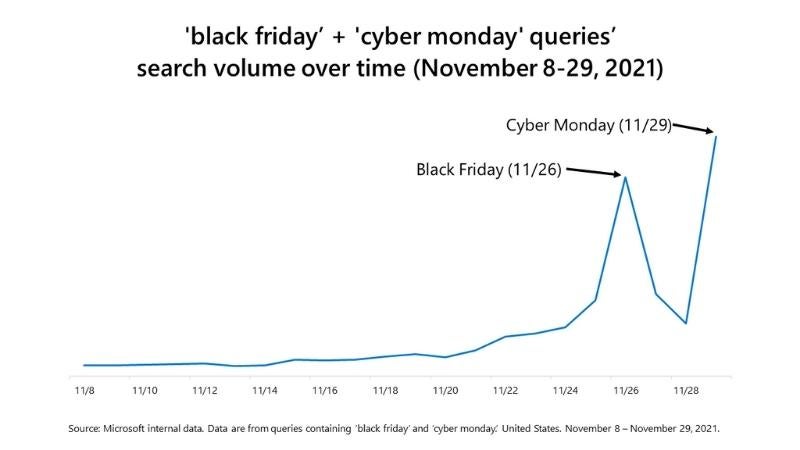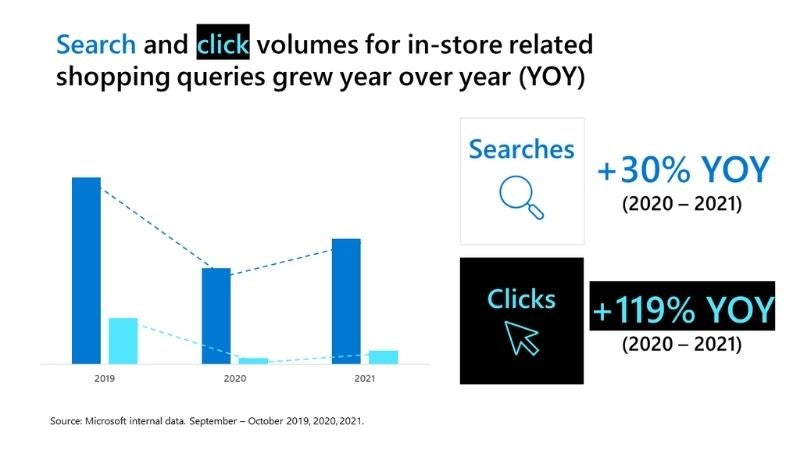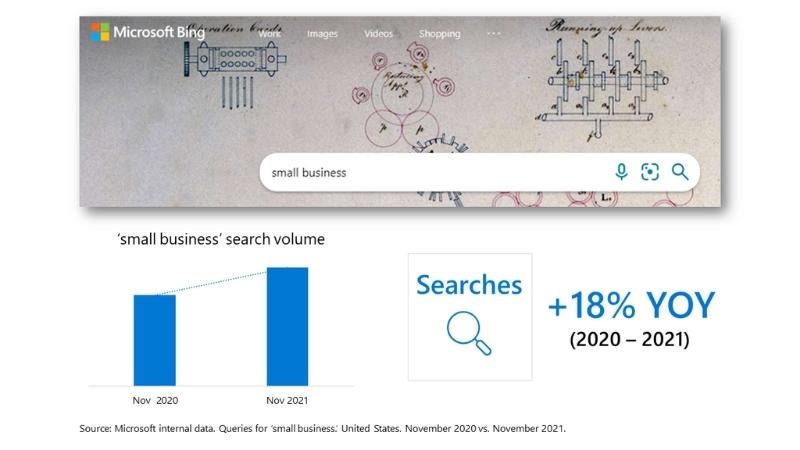Blog post
How Black Friday and Cyber Monday 2021 were different, and what advertisers can do about it

Supply chain shortages have been ongoingly impacting retailers and their ability to meet increased shopping demands, so this year, Retail brands attempted to get ahead of the festive holiday season shopping rush by launching more promotions in October than in years prior.1 With deals and steals being available well before Cyber Week (U.S. Thanksgiving Day to Cyber Monday) this year, among other potential factors, sales activity and buzz surrounding the Black Friday and Cyber Monday Retail holidays decreased in 2021.1
Although the results are surprising, change can create new opportunities. Here are some key trends, the opportunities, and what advertisers can do to adapt, survive, and thrive into the new year.
2021 Black Friday and Cyber Monday sales were softer than in 2020, but overall festive holiday digital sales were up in November1
Black Friday and Cyber Monday, which bookend Cyber Weekend, had year-over-year (YOY) declines in sales: 1.3% and 1.4%, respectively.1 The longer shopping season coupled with earlier promotions this year likely affected these results, which were replicated in the 1.4% YOY decline in Cyber Week spend.1 While the softening of sales was slightly less pronounced on Black Friday compared to Cyber Monday, which may have been influenced by an increased readiness to return to in-store shopping, festive holiday digital spend between November 1 and November 29 increased 11.9% to $109.8 billion.1
The YOY growth in digital spending in November is an optimistic signal for advertisers like you. It means there could be even more opportunities this year than last for you to earn new customers for life and grow the investment of your existing customers. While competition is at its highest for Retail during Q4 of the calendar year, testing many tactics and learning what works best for your brand can help you reach your audiences at greater scale and lower costs and in turn grow your brand and bottom line.
Pro tips:
- With a large portion of the festive shopping season already behind us, launch In-market Audiences to expand your audience and target people who are ready to buy your products.
- Attract shoppers’ attention with Multimedia Ads, which showcase your brand and products with a rich, visual ad format.
- Work smarter, not harder, by leveraging the power of automation. Responsive Search Ads customize your ad content with a more flexible ad experience that shows the right message at the right time.
- Use Shared Budgets to redistribute unused budget to top campaigns. People will continue to purchase gifts over the remainder of this shopping season, so the solution will help reduce the chances of your best campaigns pausing.
- Break through the noise to create deep emotional connections with your customers, boost awareness, and drive leads with video ads.
- Reserve advertising budget for January and the days after Christmas, when people will make returns and exchanges and use gift cards.
2021 Black Friday and Cyber Monday-specific searches were also soft on the Microsoft Search Network2
On the Microsoft Search Network (learn about our audience), we similarly saw a decreased interest in the two core shopping holidays in 2021.2 Firstly, we should note that not all is too different, as seasonal search activity patterns for queries containing 'black friday' and 'cyber monday' were similar to years past: This year, searches started to ramp up around November 22, hit a peak on Black Friday (November 26), and then tapered off until spiking to their maximum volume on Cyber Monday (November 29).2

Why this year was different, and why the difference is important for advertisers, is that there was a 9.6% YOY decline in searches for ‘black friday’ and ‘cyber monday,’ which indicates consumer interest may be shifting away from the milestone festive holiday shopping days and toward the extended October-to-January shopping season.2 As a result, it is even more important now for you to be in-market with ad campaigns throughout these months to try to influence decision-making when and where your customers are considering and buying products and services.
Pro tips:
- Use Shopping Campaigns to drive more customers to your products with engaging retail experiences.
- Extend your search campaigns to reach your audiences at multiple brand-safe touchpoints with Microsoft Audience Network native advertising.
- Stay on top of trending and emerging queries with Dynamic Search Ads, which automatically increase your search term coverage using customized ad experiences.
Just for fun: Although Black Friday and Cyber Monday search volumes decreased,2 the Microsoft Search Network experienced considerable growth in many Retail categories.3 Just a few of the hottest growing Cyber Week search categories this year included Apparel (+134% YOY),3 Beauty & Personal Care (+79% YOY),3 and Consumer Electronics (+60% YOY).3
In-store shopping made a comeback with people returning to brick-and-mortar stores in droves4
Whether it’s looking at or feeling products in person, trying them out or on before purchasing, saving on shipping costs or avoiding the risk of delayed shipments, or simply enjoying the experience of walking through a store, there are several reasons why people may prefer in-store shopping to ecommerce. With COVID-19 vaccines now widely available in the United States,5 people may have felt safer this year returning to physical stores after being forced to adapt to online shopping up to this point. Our data signaled there was increased interest in the return to in-store shopping in September and October 2021, but that sentiment actually extended from search to real life over Cyber Week with the number of in-store shoppers from U.S. Thanksgiving Day to Cyber Monday having increased from 92.3 million in 2020 to 104.9 million in 2021.4

Advertisers should take note that their physical shops need to be kept top of mind digitally for people who research products and/or deals online before shopping in person, prefer to buy online and pick up in-store (BOPIS) or collect items via curbside pickup, or make hassle-free returns. Just because someone is browsing your site or your product categories in search does not necessarily mean they will complete their purchases digitally. Show them online what you offer, where you offer it, your real-time inventory, and what sets your brand apart from your competition to drive sales at your brick-and-mortar store(s).
Pro tips:
- Help customers find your physical store(s) with Location Extensions.
- Promote products available in your store(s) to nearby customers, and display how far away they are from your closest store on mobile devices with Local Inventory Ads. Feeling festive? Check out the "Demystifying Local Inventory Ads" short video for the (fun!) full scoop.
- Differentiate your brand from your competitors with Marketing with Purpose Business Attributes (e.g., black-owned, eco-friendly, no-contact delivery, vegan, etc.), which showcase the ways your brand demonstrates responsibility, how your brand values align with the values of your customers, and how your brand is being inclusive.
Supporting small businesses was top of mind for shoppers6
In-store shopping trends reflect people’s desire to return to in-person events and moreover an in-person life. The large rebound of in-store shopping could signal that entertaining, gathering, and celebrating with others may also see an uptick over last year. Whether it be Christmas, Hanukkah, Kwanza, New Year’s Eve, seasonal sips and suppers in between, or a host of other traditional and nontraditional holidays and activities, many people want to enjoy their time with loved ones, which often requires shopping for everyday items like food, beverages, decorative supplies, and even gifts.
In a Cyber Week trends survey, 93% of Americans stated they typically travel 20 minutes or less when shopping for everyday purchases.7 This means small businesses (SMBs) have an opportunity to appeal to those preparing for gatherings, many who are neighbors likely already shopping nearby.7 In our search marketplace, we saw an 18% YOY increase in searches for ‘small business’ over Cyber Week, which indicates people are increasingly seeking to buy local and invest in SMBs.6 Not only have people been searching more for this, they are getting out of the house to make it happen: 51 million visited physical stores on Small Business Saturday (November 27), making it the second-most popular day of in-store shopping this festive holiday season, and 71% of those people indicated they were intentionally shopping for Small Business Saturday.4

There is a lot more love for SMBs this year, so these advertisers should revel in this trend and seize the opportunity accordingly. If you're an SMB advertiser, be clear in your advertising that your brand is a local business to attract those who are increasingly wanting to invest in their communities. Also be aware of the connectedness of digital and physical shopping. For example, many people conduct product research online before visiting brick-and-mortar stores to make purchases, and many people visit physical stores to experience products before buying them online. To inspire those who are shopping for festive gatherings to visit your local shop, digital advertising is essential. The path to a single sale can have multiple brand touchpoints in your customers’ decision journeys, so paid search and native advertising can help you make and keep your brand considered among those for whom it matters. Better yet, you'll usually only pay when people are engaging with your advertisements (pay per click, or PPC).
Pro tips:
- For new Microsoft Advertising SMB advertisers, visit the Small Business hub to get started quickly and easily (You can save time by importing your Google Ads and Facebook Ads campaigns with Google Import and Facebook Import!).
- Implement the “small business” or “local business” Marketing with Purpose Business Attributes to appeal to those who want to support SMBs and buy local.
- Highlight in ad copy flexible shopping options like BOPIS and curbside pickup to attract people who are researching and buying online before visiting your brick-and-mortar store.
- Sign up for Bing Places for Business to add your business to Microsoft Bing. It's free advertising for your digital and physical storefronts, plus you can benefit from those undecided shoppers who stumble upon your business when walking around the neighborhood, or like what they see when searching for your types of products and/or services and choose to give you a try.
- Set up Microsoft Clarity to optimize your website so your advertising is more effective. Learn the customer decision journey (your customers' paths to conversion) and how people engage with your site (heatmaps) with free powerful analytics.
There is still time to test, learn, optimize, and find new customers.
Although this year's Black Friday and Cyber Monday were different, there is a reason to rejoice with new opportunities emerging. Change may sometimes seem like the only constant in the world, but it isn't; our dedication to you is also unwavering. We love hearing your goals and providing solutions that help you achieve them (and also building new solutions and products to make it even easier for you!), but our greatest joy comes when you succeed. We are here to help you attain your best holiday advertising results yet, so please do not hesitate to reach out to your account team or contact Microsoft Advertising Support.
Happy holiday advertising!
Festive holiday advertising resources
For more festive season advertising resources, Microsoft Advertising Insights is here to bring you the latest data to help you make informed decisions as you plan the rest of your festive season campaign strategies and tactics. To learn more about how you can leverage Microsoft Advertising features like Shopping Campaigns, print out our Holiday checklist. For an entertaining way to learn about how you can boost in-store sales, watch the "Demystifying Local Inventory Ads" short video. For broader Retail content, product updates, and actionable insights, visit our Retail insights content hub.
[1] Adobe Communications Team. "Adobe: Consumers spent $10.7 billion on Cyber Monday, $109.8 billion so far this holiday season." Adobe. November 30, 2021.
[2] Microsoft internal data. Data are from queries containing ‘black friday’ and ‘cyber monday.’ United States. November 8 – November 29, 2021.
[3] Microsoft internal data. Retail queries grouped by custom categorization. United States. November 8 – November 29, 2021.
[4] Inman, Danielle. "Nearly 180 Million Shop Over Thanksgiving Holiday Weekend." National Retail Federation (NRF). November 30, 2021.
[5] "Different COVID-19 Vaccines." Centers for Disease Control and Prevention (CDC). November 24, 2021.
[6] Microsoft internal data. Queries for ‘small business.’ United States. November 2020 vs. November 2021.
[7] “2020 Cyber Week Trends Report.” BigCommerce. 2020.





